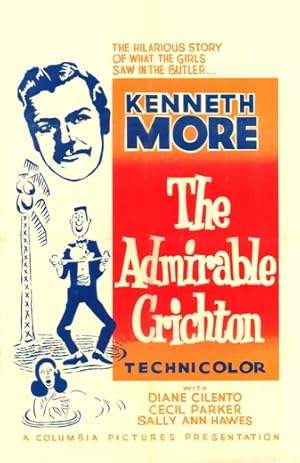Paradise Lagoon
| 1957Directed by: Lewis Gilbert
Main Plot
Paradise Lagoon follows the story of a group of friends who embark on a sailing trip to a remote tropical island. Seeking adventure and a break from their everyday lives, they set out with high hopes for relaxation and fun. However, their idyllic getaway takes an unexpected turn when they encounter a series of challenges that test their friendships and resolve. As they navigate the beauty and dangers of the island, they confront personal conflicts and the realities of their relationships. The lush setting serves as both a paradise and a backdrop for self-discovery, forcing each character to reflect on their lives and choices. The film explores themes of friendship, love, and the quest for freedom, ultimately highlighting the transformative power of nature and the bonds that tie people together.
Characters
- Kenneth More plays Lord Loam, a British aristocrat who, after being shipwrecked on a deserted island, must adapt to a new social order where his butler takes charge.
- Diane Cilento plays Lady Mary, a refined aristocrat who adapts to survival challenges after being shipwrecked on a deserted island, ultimately revealing her resilience and resourcefulness.
- Cecil Parker plays Lord Loam, a wealthy aristocrat whose shipwreck forces him and his family to adapt to a new social order on a deserted island.
Ending Explained
In the ending of Paradise Lagoon, the main characters confront the reality of their choices and the impact of their relationships on their lives. After a series of personal struggles and conflicts, they gather at the lagoon, a symbol of both their dreams and the challenges they face. The climax occurs when they must decide whether to pursue their individual desires or to come together as a community. As tensions rise, the characters reflect on their past experiences and the bonds they have formed. Ultimately, they choose to embrace their shared history and the beauty of their surroundings, leading to a moment of unity. This decision resolves the main conflict by highlighting the importance of connection and collaboration over isolation and self-interest. The film concludes with a sense of hope and renewal, as the characters recognize that their future lies not in escaping their problems but in facing them together. The lagoon, once a place of conflict, transforms into a sanctuary of reconciliation and understanding. This resolution ties back to the overall narrative, emphasizing themes of community, love, and the power of shared experiences in overcoming adversity. The ending leaves viewers with a poignant message about the strength found in togetherness.
